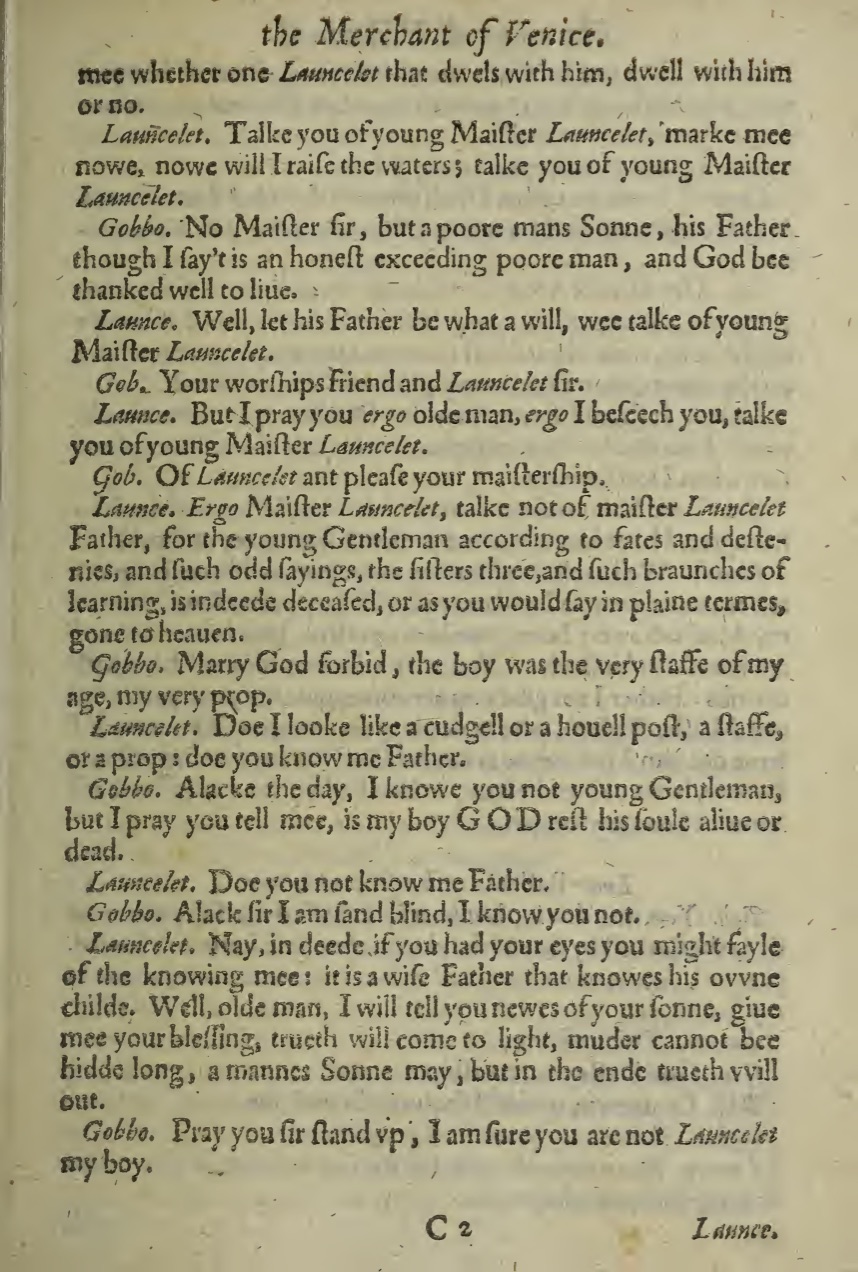- In the Book of Genesis, Jacob deceives his blind father, Isaac, highlighting the interpreted prosperity of being dishonest. In modern editions of this play, there is an aside present before Lancelot says “Mark me now.” His aside in “raising the waters,” enlightens audiences in his attempt to deceive his blind father in this scene by pretending to be someone else. Raising the waters, also interestingly reminds us of the geographical setting, Venice, which is surrounded by water. Raising water, in that sense, would drown the city, aligning with the misfortune of being deceived. Lancelot, in the Arthurian legend, deceives Arthur, if you will, by having an affair with his wife. King Arthur, as the heroic saviour of England and the King who knighted Lancelot, can be viewed as a potential father figure for Lancelot, corroborating his deception both in the Arthurian legend and explaining Shakespeare’s choices in this character’s name given his similar acts of trickery.
- Italicization of “Lancelot” accentuates the trick being played on Gobbo, since he doesn’t know who he is really speaking to (Lancelot).
- Gobbo’s shortened name, Gob, pays reference to Job, a key Hebrew Bible figure who is depicted as a family-oriented man who is challenged by Satan (and God) with incessant disasters that take everything from him. In the original text, Shakespeare has only abbreviated Gobbo for two consecutive lines. “Your worships friend and Launcelot” points out his simplicity, referring to himself as a “poor man.” Shakespare is likely trying to strengthen the comparison between Gobbo and Job from the Hebrew Book of Job in these lines to subtly depict Gobbo as a man with nothing left.
- The word Maister refers to the feudal system. The Feudal system was a social system where landowners provided housing for people that were of a lower social class. These people lived on their land in exchange for service. Master was a term used to address the landowning men. It is important to note that Master was a term used to describe men, as denoted through the capitalization. This shows the importance placed on men during the time that this was edited. Further, in thinking about the Book of Job (see note 3), Job has lost everything, including what he may have held as his title. For that reason, his son in this play, Lancelot, would also not be deemed a master: ”No Maister sir, but a poore mans sonne.”
- The use of the word marry is interesting here. In earlier versions of the text (http://shakespeare-online.com/plays/merchant_2_2.html ), marry was spelt “mary,” like the Virgin Mary. Shakespeare is subtly incorporating more religion into the play. We think it is important to note that Shakespeare makes a reference to the Virgin Mary during a conversation between father and son.
- Cudgell, noun. A short, thick stick used as a weapon.OED Online, Oxford University Press, December 2020, www.oed.com/view/Entry/184702. Accessed 1 December 2020. All subsequent definitions come from the OED, unless otherwise noted.
- Originally fully capitalized as “GOD,” calling on the religious importance and relevance of this scene and corroborating the theory of capitalizing solely male-identifying words.
- Another reference to Isaac in the Book of Genesis (see Note 1).
- Written in the archaic text, this line reads like, “it is a wife Father that knowes his owne childe.” Though “wise” is the intended word, it is important to note the patriarchal interpretation of this line given the diction (e.g. “owne”) as “women were the property of their fathers” (https://www.jstor.org/stable/743394?seq=1#metadata_info_tab_contents).
- His line is paraphrased from the Bible when John in 3:21 writes: “But whoever practices the truth comes into the Light.” Here, Shakespeare is highlighting that what is kept will eventually come out. It is ironic that he says this here as Launcelot is keeping his identity secret from his father.
- The use of the word light here juxtaposes Gobbo’s blindness. It is also ironic that Launcelot is using the word light when speaking to his father, who obviously has a disability.
- Lancelot, by the end of the play becomes a father himself, as he has impregnated a Moor in Portia’s court. The persistent reminder of age on this page insinuates a cyclical relationship between father and son, where Lancelot, with time, will learn to inhabit the role of father and quit his antics.
